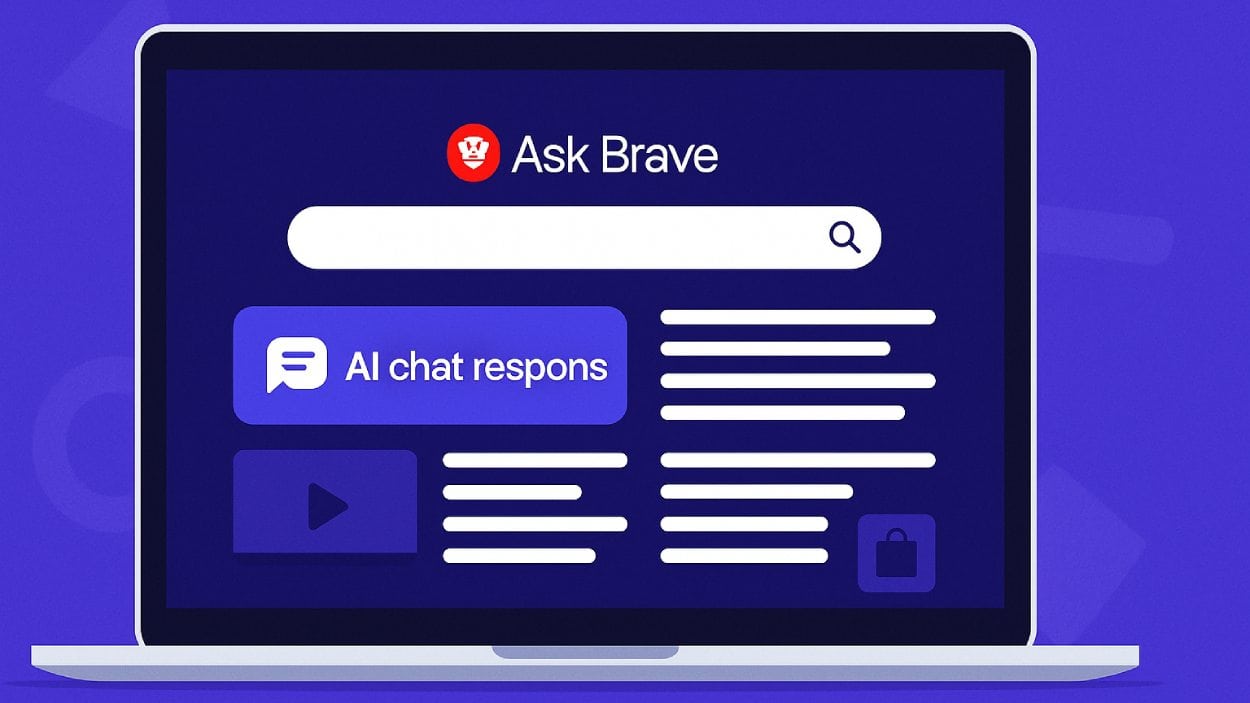Brave has rolled out a new AI-powered feature called Ask Brave, offering users a smarter and more interactive search experience by combining traditional search results with chat-based AI answers.
Quick Summary – TLDR:
- Ask Brave merges AI chat responses with traditional search results like web links, videos, and product listings.
- Accessible on all browsers through Brave Search, it offers a seamless, privacy-first experience.
- Includes Deep Research mode for thorough answers, backed by Brave’s proprietary search index.
- Conversations are encrypted, deleted after 24 hours, and not used for AI training, ensuring user privacy.
What Happened?
Brave, the privacy-centric browser and search engine company, has introduced Ask Brave, a new feature that unifies its AI capabilities with conventional search tools. Available at search.brave.com/ask, the feature aims to eliminate the need to switch between chatbots and regular search engines by offering everything in one place.
Should you use a search engine or a chatbot for your question?
— Brave (@brave) September 29, 2025
With Brave Search, you don’t have to decide. Our new feature, Ask Brave, combines search and AI chat into one.
Ask Brave is free and available now on all platforms and browsers. pic.twitter.com/S9v9UQUVKE
A Unified AI-Search Experience
Ask Brave builds on Brave’s previous AI product, AI Answers, which was designed to provide quick summaries of user queries. While AI Answers continues to be available, Ask Brave goes several steps further. It offers longer, interactive responses, follow-up chat capabilities, and context-rich results that include videos, news links, images, product listings, and more.
Josep M. Pujol, Chief of Search at Brave, said in a statement,
How Does Ask Brave Work?
There are multiple ways to trigger Ask Brave:
- Append double question marks (“??”) to your query when using Brave Search.
- Click the “Ask” button on the Brave Search homepage.
- Tap the “Ask” tab on any search results page.
- Set your homepage directly to the Ask Brave interface.
The system uses two modes:
- Standard Mode: Offers direct AI responses based on the query.
- Deep Research Mode: Runs multiple internal searches to cover blind spots and provide deeper insights.
Ask Brave’s format resembles tools like ChatGPT or Perplexity, where the answer feels like a structured report. Users can also ask follow-up questions or request different answer formats, making it a flexible tool for deeper research.
Built on Brave’s Own Technology
Ask Brave is grounded in Brave’s proprietary Search API, which scans over 35 billion webpages. This ensures that answers are less likely to hallucinate or include irrelevant information, a common issue in AI chat tools.
In internal testing, Brave says Ask Brave achieved a 94.9 percent accuracy rate on the SimpleQA benchmark.
A Big Leap for Privacy-Focused AI
As with everything Brave builds, privacy remains central. Ask Brave:
- Does not store IP addresses.
- Encrypts all chats.
- Deletes all conversations after 24 hours of inactivity.
- Does not use user interactions to train AI models.
This privacy-first approach stands in contrast to other major players like Google and Microsoft, which often log user data for AI training and personalization unless users manually opt out.
Competitive Context
Ask Brave arrives amid a surge in AI-powered search integrations. Google is expanding its AI Mode globally, and Microsoft has embedded Copilot into Bing and Edge. Brave, however, is pitching itself as the privacy-first alternative to these giants.
The company says Brave Search is now the third-largest independent search engine, handling around 1.5 billion queries monthly, while the Brave browser has over 97 million monthly active users.
SQ Magazine Takeaway
I love what Brave is doing here. It’s not just another AI tool slapped onto a search engine. Ask Brave genuinely rethinks how we interact with web search. The ability to seamlessly switch between AI and traditional results, or view both side by side, is exactly what we’ve needed. And the privacy-first philosophy? That’s huge. In a world where most AI tools trade user data for “personalization,” Brave is showing that you don’t have to compromise to get powerful AI features. I think it’s a major step forward for how we’ll search online in the AI era.


































































